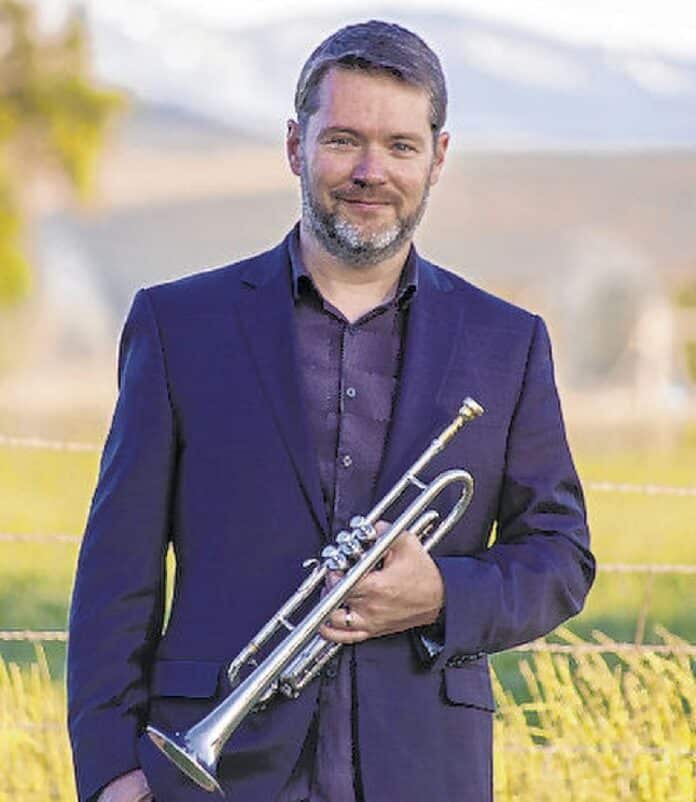
It’s composed of only four different notes, performed in a prescribed rhythm in military precision, that a trumpet player performs on Memorial Day during remembrance services.
“Taps,” created as a bugle call, has been part of U.S. military funerals for centuries, and is the traditional tribute to the fallen today.
While many people might think it is a simple piece of music, it’s weight and poignancy has spoken to the trumpet players who perform it.
“The hardest challenge for me is always getting out of my mind — it’s such a weighty piece of music with so much emotional meaning to so many people,” said Eddie Ludema, who performed “Taps” at many SALUTE! concerts in Columbus over the past decade.
“It’s four notes — but it takes more than a minute to play it. I studied with John Rommel at the Indiana University’s Jacobs School of Music, and he used to tell us to focus on the beautiful sound. It (“Taps”) is kind of a meditation. I always hoped when I played it that I was making someone feel better.”
“Taps” is performed at military wreath ceremonies conducted at the Tomb of the Unknown Soldier, including ceremonies today.
Ludema performed it for the Columbus Indiana Philharmonic SALUTE! concert many times before his recent move to Pocatello, Idaho, as an assistant professor teaching trumpet and music theory at Idaho State University, at “beautiful Pocatello, Idaho,” as he describes it.
His first time to perform “Taps” was as a teenager, performing at a Boy Scout Eagle Court of Honor. He had learned “Taps” mostly on his own, with some help from a middle school band director.
Learning “Taps” and other bugle tunes is somewhat of a rite of passage for most trumpet players, Ludema said.
“I can’t speak for everyone, but if you play the trumpet, you do learn the bugle tunes,” he said. “’Taps’” and ‘Reveille’ are probably the most well-known of those.”
If you’re not sure what ‘Reveille’ is, think back to Radar on “MASH” bungling the tune when assembling the camp for inspection. Ludema laughed at that reference saying many trumpet players might think, “if Radar can do it, anyone can.”
But to give “Taps” the performance that is deserved, preparation is required.
“Technically, it’s quite simple,” Ludema said. “But it’s difficult to play it well and to get the meaning across — to play it reverently.”
Ludema would take at least a couple weeks before each SALUTE! concert to prepare “Taps,” and have it ready for performance.
There can be endurance issues tied to performing it as part of an overall concert, he said.
“For the SALUTE! concert, there is a lot of music — a lot of trumpet playing,” he said. “It’s very physical. ‘Taps’ is usually played right after the first half and it’s a heavy first half of music. It can take a few weeks to get the fundamentals down and be ready to perform it.”
For Ludema, the challenge is getting out of his own mindset of the emotional meaning behind the song in order to perform it with technical precision and beautifully.
“I always would try to just perform it as beautifully as I could and after that, fall apart,” he said. “Beforehand I try to block out the emotion of it — I do want to feel the emotion that is a part of it, but it needs to be done perfectly.”
Ludema remembers in one of his early performances of “Taps” that a high-ranking military official mentioned to Philharmonic Artistic Director David Bowden that Ludema had performed “Taps” well, but suggested that Bowden ask the trumpet player to make sure to get the rhythms right for the notes.
“I’m not military — and ‘Taps’ does feel like a military service and a duty,” Ludema said of his approach taking to heart that performance feedback. He researched more into military performances of the piece and gathered the nuance of the cadence that was being referenced.
Ludema said he would go to the Veterans Memorial pillars on the Bartholomew County Courthouse lawn where the SALUTE! concert is performed to read the names there. Those names have lingered in his mind as he has played “Taps,” he said.
“When you finish the last note and release it, sometimes I would go back stage (at SALUTE!) and fall apart,” he said. “It’s one of the most emotional pieces of music a trumpet player can play. There is just so much weight to it.”




